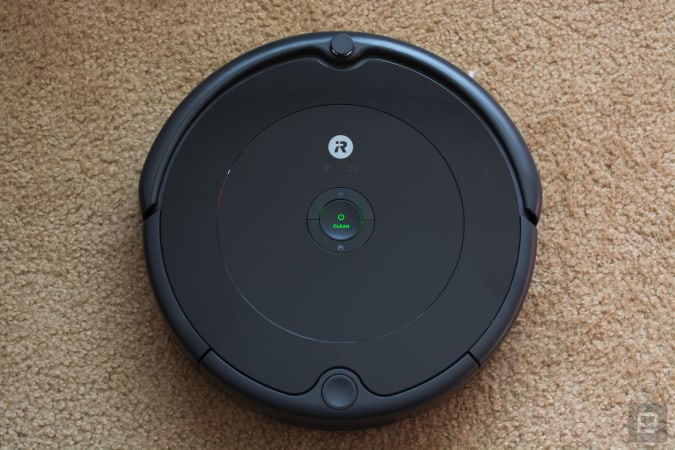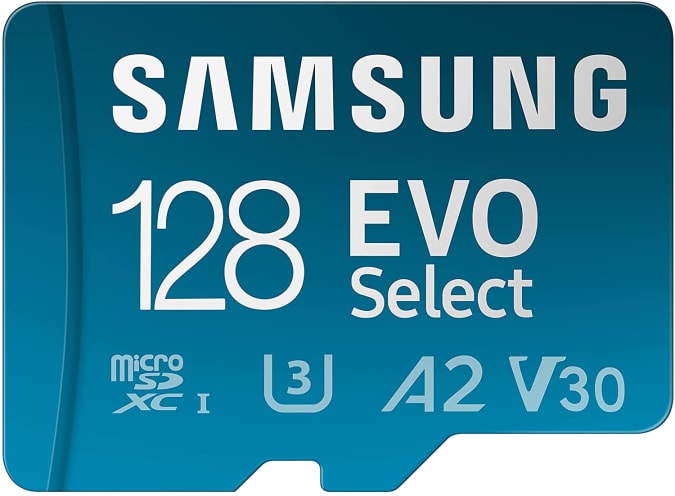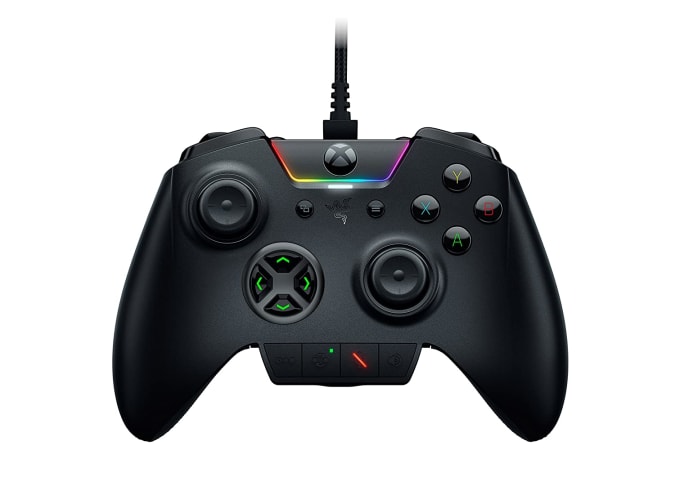Engadget |
- Bungie responds to report on its lackluster efforts to improve workplace culture
- Twitter reportedly knew Spaces could be misused due to a lack of moderation
- Senate bill would facilitate social platforms sharing data with outside researchers
- Sony buys co-development studio Valkyrie Entertainment
- Analogue will reopen Pocket orders on December 14th
- How a VR startup took the money and ran to the metaverse
- Retro online gaming service Piepacker adds five Atari classics to catalog
- Marvel's 'Eternals' will hit Disney+ on January 12th
- Apple's second-gen AirPods drop to $100, plus the rest of the week's best tech deals
- 'PUBG: Battlegrounds' is going free to play, but ranked mode will still cost you
- 'Banjo-Kazooie' joins the Switch Online Expansion Pack in January
- TCL temporarily pulls Google TV sets from sale over performance issues
- Apple's third-gen AirPods fall to an all-time low of $140
- Engadget Podcast: The best and worst in tech 2021
- LG's design-focused OLED Evo TV has a motorized cover
- Yamaha YH-L700A review: When premium features aren’t enough
- 'Sonic The Hedgehog 2' trailer gives us a first look at Knuckles
- The Morning After: 'Alan Wake 2' is coming in 2023
- UK High Court rules that Julian Assange can be extradited to the US
- Microsoft tried and failed to bring Xbox games to the iOS App Store
| Bungie responds to report on its lackluster efforts to improve workplace culture Posted: 10 Dec 2021 01:12 PM PST In September, Bungie, attempting to distance itself from former publisher Activision, announced a series of reforms designed to foster increased diversity and inclusion. CEO Pete Parsons said his hope was the studio's efforts would set an example for the wider gaming industry. At the time, it appeared the announcement was a proactive move by Bungie, but now it seems the studio was responding to some of its own inner turmoil. In response to a story from IGN reporting on years of systematic sexism and workplace harassment at the studio, Parsons has published an apology letter. "I am not here to refute or to challenge the experiences we're seeing shared today by people who have graced our studio with their time and talent," he says. "Our actions or, in some cases, inactions, caused these people pain. I apologize personally and on behalf of everyone at Bungie who I know feels a deep sense of empathy and sadness reading through these accounts." He says over the last several years Bungie has made "significant" changes to foster a better workplace. At the top of that list, he notes the studio has removed "bad actors" irrespective of their "tenure, seniority or interpersonal relationships."
That's not something it appears was true of Bungie in the past. In one section of the report, IGN recounts the story of a Destiny narrative lead who threw a chair at a window because "he felt others were ruining his creative vision of the game." That individual reportedly stayed at the company for several years after that incident until he left and was later hired to do contract work for Destiny 2. The report also notes many employees wrote letters to Parsons begging for him to intervene in a variety of workplace issues. He reportedly never responded to those pleas. As things stand today, Parsons says he believes employees whose behavior warranted removal were either fired or they no longer work at Bungie. If new information comes to light, Parsons pledged Bungie would investigate those reports "with integrity." After reiterating the studio's commitment to the reforms it announced in September, Parson's letter turns to Bungie's recent hiring efforts. Over the past five years, he says the number of employees who identify as women or as someone from an underrepresented community has increased to 20.5 percent and 18.6 percent, respectively. In 2021, 31 and 23 percent of the studio's hires were employees who identified as part of those two groups. What he doesn't mention is where those numbers were previously. Without historical data, it's impossible to know how much better Bungie has become at hiring more diverse candidates. While the sexual harassment scandal at Activision Blizzard has dominated headlines in recent months, today's IGN report underscores that there are toxic workplaces across the gaming industry. Harassment and management protecting abusers: these are issues that keep coming up year after year. They're not exclusive to one company because many of them have been built in the same way, and it will take a concerted effort to undo those cultures. |
| Twitter reportedly knew Spaces could be misused due to a lack of moderation Posted: 10 Dec 2021 12:15 PM PST Since Twitter Spaces debuted earlier this year, hundreds of people have reportedly joined live audio discussions led by "Taliban supporters, white nationalists, and anti-vaccine activists sowing coronavirus misinformation." According to The Washington Post, Twitter didn't have the moderation tools necessary to combat bullying, calls for violence and hate speech in Spaces before rolling out the Clubhouse competitor — despite executives knowing that would likely lead to misuse. Spaces doesn't have human moderators or tech that can monitor audio in real-time. It's much more difficult to automatically review audio than text. So far, Twitter has relied on the community to report Spaces they think violates the company's rules. However, if a host uses the feature as a soapbox to share transphobic, racist or otherwise bigoted views (as has reportedly happened), and their audience agrees with them, it seems unlikely that a listener will report the discussion to Twitter's safety team. According to the report, Twitter's technology helped some of these discussions to go viral. Because these Spaces were amassing large audiences, the systems understood them to be popular, and promoted them to more users. Twitter spokesperson Viviana Wiewall told the Post the supposed bug has been dealt with. "Ensuring people's safety and encouraging healthy conversations, while helping hosts and listeners to control their experience, have been key priorities since the beginning of [Spaces'] development," Wiewall told the publication. Wiewall noted that the company is "exploring avenues" in terms of moderating Spaces in real-time, "but it's not something that we have available at this time." The spokesperson noted that Twitter did have some protections in place. It can scan the titles of Spaces to look for keywords that raise red flags, but modified spellings can ensure problematic words bypass the filters. Twitter employees are said to have raised concerns about unmoderated live audio rooms, but some of those who suggested the company should slow down and work on technology to improve safety were reportedly dismissed from or left out of meetings. Leaders forged ahead with the Spaces feature anyway, at least in part to appease investors by speeding up product development and generating more revenue. Since August, hosts who meet certain criteria have been able to charge for access to Spaces, with Twitter taking a cut. The company has been chasing other revenue streams beyond advertising, including newsletters and the Twitter Blue premium subscription. There have been issues with some of those products too. The Tip Jar feature, through which users can send payments to each other as tips, exposed some tippers' home addresses via certain types of PayPal transactions. Engadget has contacted Twitter for comment. |
| Senate bill would facilitate social platforms sharing data with outside researchers Posted: 10 Dec 2021 11:53 AM PST A bill announced yesterday would open social media company data to scrutiny by outside researchers. Sponsored by Senators Klobuchar (D-MN), Coons (D-DE)and Portman (R-OH), it proposes to use the National Science Foundation as the intermediary between sensitive platform information and requests from interested parties. Senate aides, speaking under condition of anonymity to the Wall Street Journal, claim the bill is a direct response to recent disclosures about negative externalities associated with Instagram. Documents shared with the Journal in September indicated Meta (then known as Facebook) had conducted internal studies which found use of the Instagram app was damaging to mental health and body image for some users, especially teen girls. The bill also follows a Senate subcommittee on child safety hearing this Wednesday where lawmakers grilled Instagram CEO Adam Mosseri over these same issues. Many came armed with their own experiences creating dummy accounts meant to mimic teenagers, and the disturbing content the platform pushed these accounts towards, including self-harm and "anorexia coaches." While the proposed bill would apply broadly to large social media companies, Meta has a particularly bad track record regarding disclosure for academic purposes. It managed to taint a raft of ongoing studies by providing incomplete data sets in September. A month earlier it actively deplatformed New York University researchers who were studying misinformation and political ads on Facebook. (Their findings indicated that misinformation flourishes there.) It's too early to know exactly what shape this bill will take should it move forward. But as Senator Richard Blumenthal (D-CT) told Mosseri earlier this week, "the days of self-policing are over." |
| Sony buys co-development studio Valkyrie Entertainment Posted: 10 Dec 2021 10:56 AM PST Sony has acquired Seattle-based developer Valkyrie Entertainment. Financial terms of the deal haven't been disclosed. Founded in 2002, it's best known for providing co-development services to other game studios. In the past, Valkyrie has worked with Sony, Microsoft and Riot to help on titles like God of War, Halo Infinite and Valorant. Before today's announcement, it was working on God of War: Ragnarok with Sony's Santa Monica Studio.
The acquisition was announced by Herman Hulst, the head of PlayStation Studios. "Valkyrie's diverse capabilities will be welcomed by every team at PlayStation Studios as we continue to focus on delivering extraordinary gaming experiences," he said in a statement. For Sony, the deal caps off a year full of studio purchases. In the last 12 months, the company has added Housemarque, Nixxes Software, Firesprite, Bluepoint Games and now Valkyrie Entertainment to its first-party lineup for a total of 17 studios under its banner. Sony used to be a lot more methodical when it came to its talent acquisitions. Between 2010 and 2020, it only added two studios: Sucker Punch Productions and Insomniac Games. If there's a reason for the change in pace, it likely has at least something to do with Microsoft's $7.5 billion deal to buy Bethesda parent company ZeniMax Media in 2020. |
| Analogue will reopen Pocket orders on December 14th Posted: 10 Dec 2021 09:34 AM PST Analogue will, at long last, start shipping its retro Pocket console on December 13th. If you weren't able to lock in a pre-order the first time around, you'll get a second chance, as the company will reopen sales the following day at 11AM ET.
Orders will be placed into three fulfillment batches — January-March 2022, October-December 2022 and 2023 — on a first-come first-serve basis. However, "due to industry wide component price increases," the price of the console is going up by $20 to $219. If you're on the fence, Analogue notes that reviews will be published on Monday. In any case, you can cancel your order at any time before it ships. The Analogue Pocket has been a long time coming. The handheld — which can play Game Boy, Game Gear, Neo Geo Pocket Color and Atari Lynx games from their original cartridges — was originally supposed to arrive in 2020. However, complications brought forth in part by the COVID-19 pandemic, as well as global supply chain issues, forced Analogue to delay the system multiple times. |
| How a VR startup took the money and ran to the metaverse Posted: 10 Dec 2021 09:00 AM PST The tech buzzword of the season is "metaverse." Facebook kicked the craze into high gear at its Connect conference in late October, featuring an hour-long image-rehabilitation video where Mark Zuckerberg revealed the company's new name, Meta, and showed off a vague digital-first future called the metaverse. Dedric Reid has been selling his own version of the metaverse on and off for the past five years. He calls it MetaWorld and describes it as a persistent, decentralized space filled with life and change. It's a "10,000 square mile vast-scale simulation, owned by community and run by community," according to Reid. He's said it's his life's work. MetaWorld Like many other organizations at the moment, Reid has been using the buzz around the metaverse to ramp up his own promotional efforts. MetaWorld has a slick website, a fresh YouTube channel, a new Discord server and Reid hosts daily chats on Clubhouse. He recently launched a marketplace where he's selling digital parcels of land and property as NFTs. In the MetaWorld Discord server, a "press" channel lists articles from Engadget, Alphr, TechRadar, UploadVR, VentureBeat, Tom's Hardware, Variety and CNBC, and links to a video from New Scientist magazine. Early on November 3rd, a user named Wolfssskin entered the MetaWorld press room and started typing. "Interesting that you think you can do the same scam again," Wolf said. "What's interesting is that you think that you can stalk and harass me," Reid wrote back. The confrontation continued with Reid accusing Wolf of being a troll, and Wolf claiming MetaWorld was a scam. The exchange has since been deleted, and Wolfssskin banned from the server. However, Wolf is active on another Discord server — this one also called MetaWorld and also created by Reid, though he hasn't posted in it since 2019. The old server is full of angry users who say they gave Reid their money between 2016 and 2018 to join MetaWorld, and believe they were scammed. Reid's final message in the old MetaWorld Discord server was posted on September 6th, 2019: "Check updates on the updates channel in coming weeks … I'll also be around with mods for discussion all week." No update ever came, and in the two years since, the old server has become a guide to the seven stages of grief. "It's disgusting to think that they have just left paying customers with not even a response," a user named LordGirthVader wrote in June 2020. "Yeah but that's the thing," another user named Floogey responded, "We weren't actually customers, we were victims." Engadget first interacted with Reid in 2016, when a UK startup named Improbable arranged a meeting inside a MetaWorld prototype to demonstrate Spatial OS, the startup's scalable server tech. Reid was one of several developers to make use of the company's public SDK, and Improbable thought MetaWorld made an effective demo to promote its "open community platform." Shortly after the launch of that prototype, Improbable stopped promoting or mentioning MetaWorld at all. By 2017, questions were being raised about Reid's ability to deliver on his ambitious promises, which included a custom avatar system, a living world as large as the state of Maryland, a virtual economy, rich environmental simulations and cross-platform capabilities for a variety of VR headsets. Reid started an Indiegogo campaign in April 2017, a move that prompted his former business partner and MetaWorld prototype developer, Carelton DiLeo, to publicly distance himself from the project. DiLeo noted that he was "not currently working on MetaWorld" and didn't know how Reid planned "to deliver on the promise of the fund." The Indiegogo campaign was not a success, eventually raising $3,674 of a $50,000 flexible goal, meaning Reid got to keep all of the money pledged. This was followed by a new revenue-driving initiative: land speculation. In September 2017, Road to VR noted that Reid was selling virtual land for real money, and detailed the many questions surrounding the project. Land was available to buy in three tiers, ranging from $15 for a quarter acre to $100 for two acres, though it was unclear what exactly players would do with this property, how the economy would function or how people who didn't buy land would join the game. MetaWorld was listed on Steam as an Early Access title in mid-2017, advertising consistent updates and transparent, community-driven development. There was no actual game to play, no virtual world to explore, but Reid was selling land in MetaWorld regardless. On September 28th, 2017, a blog post in the MetaWorld Steam community claimed land titles were being sent out to investors, supported by a cryptocurrency Reid had created called MetaCoin. In its September 2017 article, Road to VR concluded, "MetaWorld is headed into Early Access, which partly excuses it from being an incomplete product, but the inconsistency in messaging around the game's core mechanics and features ought to leave you worried about the stability of the still unreleased MMO." By early 2018, Reid claimed he had been investing in crypto for several years to form the economy of MetaWorld, using the cash from early land sales to build the MetaCoin fund. He said he wasn't personally making any money in the process, and all of the money coming into MetaWorld was being converted into cryptocurrency and kept in a single place called the Metabank, where it was reserved specifically for this new virtual economy.  MetaWorld Reid told Engadget in 2018, "We're a community-funded entity. So we've been working on that, in fact taking on cash and kind of forming it into cryptocurrency, and building an economy." He said he was using "robo-trading, a couple different investment tools to grow the money." Roughly a year after saying that, Reid left his final message in the original MetaWorld Discord and disappeared from the server. A few weeks after Reid's quiet exit, a user named Immortal posted in the lobby, "Been a while since I've heard anything on this game and even longer since my money was happily taken for it. Anyone know anything about this release or is this just one of those things that never happen?" "I don't expect anything to happen," a user called Myrothas replied. "Asked for a refund a year ago and many times. All I heard was: send me a mail. I did do that multiple times and never received an answer. Quite the red flag for me." Myrothas, real name Johannes Fischer, shared with Engadget a 2018 email exchange where he requested a refund through the MetaWorld help channel. "Backed this project about a year ago and expected it to come out already," he wrote in the email. "I'd like to ask for a refund." He says he never received his money. Engadget interviewed Reid twice in 2018. In these interviews, Reid explained how paying customers would build MetaWorld themselves, and how cryptocurrency would make the whole thing work as a decentralized, libertarian dreamscape. With players responsible for funding and developing MetaWorld themselves, it was difficult to pin down what exactly Reid was selling. One year after the launch of his crowdfunding campaign, Reid said he had "a design worked out in Unity" for MetaWorld, and he planned to transfer this into the existing Spatial OS ecosystem — even though Improbable, Spatial OS' parent company, wasn't actively supporting the project any longer. He claimed he'd built a procedural terrain generator for VR and also a robust avatar system with "head tracking, eyes, eye blinking, eye gazing, lip sync, upper torso support," though these features weren't ever demonstrated. Most of Reid's goals never materialized. The MetaWorld release date was pushed back again and again, until eventually the Steam page simply read, "Soon." Reid showed off high-fidelity environments on YouTube and Discord, and then later revealed MetaWorld would be a Google Blocks project, making those assets impossible. MetaWorld never went live. "We had a lot of broken promises right off the bat, that was a pretty major flag," one early adopter told Engadget under the condition of anonymity. We'll call them Morgan. "And the community was very quick to do some snooping." Engadget spoke with 11 original MetaWorld investors, including people who were deeply involved in the community and often interacted with Reid directly. Many of these members asked not to be named, considering Reid had their personal information and they didn't trust him to not misuse it. MetaWorld/Discord After a few months of missed launch dates and hollow promises, MetaWorld members discovered Reid was using images from 3D model site TurboSquid to sell land and in-game items, and they said he changed critical details about the engine and development process seemingly on a whim. As people would ask for refunds in the original Discord server, Reid would call them trolls and delete their messages. At the time, as calls for refunds were flooding the MetaWorld community, Reid told Engadget he was "in the process of coming up with a better refund policy" and he wanted to honor these requests, but it was difficult to do so without seriously affecting development. Not that Reid planned on doing much development himself — as he described it, he was a designer, the guy with the vision. According to his plan, the community would do the actual coding and game-making, after buying their way into MetaWorld. "It was around then that we learned that users would also be responsible for creating assets," Morgan said. "Assets included anything from buildings to animals… but we'd also be responsible for creating jobs, and performing said jobs to earn currency on the blockchain." Besides that, Reid told Engadget he planned to piggyback off the work happening at multibillion-dollar companies like Facebook, IBM and Google. He pointed out that these organizations had already built VR worlds, avatar systems and AI frameworks, and he said he'd simply use these to create MetaWorld. He seemed unconcerned with the concepts of intellectual property and trade secrets. "From my perspective, all code is done and written," Reid said. A few minutes on, he continued, "The code that drives the artificial intelligence — Watson, or just name your AI code — it exists, right? So I can play with concepts, whereas code's already written, right? You know what I mean? I can take from any code set I want. And I think by understanding code — I also write code. But rather than get heads down on writing code, I sort of enjoy dreaming up concepts and just understanding how things are put together." In the end, Reid was basically selling an early-concept Roblox, in VR and for adults. But first, he was asking players to build the game itself and pay him for the privilege. After all, he said, actually making MetaWorld was the easy part. "This stuff is like, it isn't rocket science," he said. "It's really pretty straightforward to throw a couple objects around and create a couple simulations, a couple VR simulations and put them together. That's not the hard part, like, making some VR games." That rudimentary 2016 demo, built before developer DiLeo left the team, is the only public proof that Reid's MetaWorld has ever existed as an inhabitable virtual place. DiLeo went on to build his own simulated environment using Spatial OS, and he sold it in October 2018 to Somnium Space, which is an established, decentralized VR platform powered by blockchain. As part of that deal, Somnium Space offered a refund and land-exchange program for angry MetaWorld customers, in an effort to rebuild trust in VR development as a whole. In October 2021, two years after Reid's final message in the old Discord, a new MetaWorld server appeared. It had a fresh logo, links to his Clubhouse group, and the same pitch as before. A "passports" channel linked to a page where people could pay $10, $20 or $30 for "exclusive community access," the opportunity to build MetaWorld, and early bidding on future NFT drops. At the time of publishing, MetaWorld NFTs have raised 5,126 MATIC (around $11,000) since their launch on November 25th. MetaWorld/Niftykit Reid is now selling virtual land and properties as NFTs on the Polygon network, and people are buying. Land tends to run from $50 to $600, payable in Polygon's MATIC currency, while a "Piano House" costs $650 and seems to be available via cash payment only. The MetaWorld website claims just 10 of these houses will be minted and simulated. "So much excitement, creative thoughts and passion for the future," Discord user Clare Bratina wrote in the new MetaWorld server on November 25th. "Definitely backing the creators and looking forward to learning how to create in the metaverse and on metaworld." Every now and then in the new server, a random member will spam the channels with warnings claiming that MetaWorld is a scam, and Reid will deny it and delete the messages. Just like old times. There is one new, unexpected feature of the revamped MetaWorld campaign: Reid, who happens to be Black, is targeting people of color. "So happy this exists!" a user called NiKole wrote in MetaWorld's "town-square" channel on September 5th. In October, a member named PixelPil0t posted, "Happy to join your Metaworld! Excited to see what you build Dedric, your background is incredible." Over the past few months, Reid has been doing much of his MetaWorld marketing on Clubhouse, where he has 1,800 followers and regularly joins talks with the Black Metaverse community, which is run by NiKole. Here's how Reid closed out a Clubhouse chat for Black Women in Blockchain on November 5th, after spending a few minutes selling MetaWorld as a Hawaii-sized VR landscape where players would be able to fly airplanes and play around in a persistent, living environment: "Much of the inspiration for the world is gearing it towards POC first. You know I've been in, sort of, the games and media industry for quite some time. And, you know, as a community we're often left behind. It's, you know, the computational world isn't exactly 'us' first, sort of, you know, we've been an afterthought. So now we are. So check out the identity system. Look forward to seeing Black faces in the MetaWorld. Peace. My name is Dedric." New users have been trickling into the new MetaWorld Discord server and Reid has been organizing its channels, most of which are empty. It's mostly newcomers, but there are also a handful of folks from the old MetaWorld server floating around, tracking the similarities between the previous project and the new promises. MetaWorld/Discord The new server used to have a "creators" channel where Reid shared images of Redwood trees and forest foliage going through the photogrammetry process, and one old-server user noticed artifacts on the pictures, where it looked like text had been Photoshopped away. This user found the original images on a website unassociated with MetaWorld or Reid, and Engadget eventually traced all the images in channel back to an 80 Level interview with environmental artist Willi Hammes of MAWI United. Engadget spoke with Reid in November, when the creators channel was still live, and asked him what photogrammetry software he was using to build MetaWorld. "I'm not actually sure," he said. "I'm not working on the photogrammetry stuff. So I'd have to ask somebody from my team what they're using to capture it." Discord Reid said he had a few freelancers working on the project, but he presented himself as the sole full-time creator of MetaWorld. Minutes after our interview, the creators channel disappeared from the Discord server, taking all the photogrammetry claims with it. Other MetaWorld assets vanished around this time, too. Reid deleted and unlisted at least two YouTube videos after facing questions about their origins. One of them, called "Generative + Procedural Design Redwood Creek," was a minute-long speedrun through the Unreal Engine 4 development process, showing the creation of a lush forest scene. It was published on October 31st. The MetaWorld logo was prominently displayed over the entire video, it started and ended with the URL for the MetaWorld website, and its description read, "Using a combination of procedural / generative Design and hand freehand design to construct MetaWorld Redwood Creek region." After establishing we were talking about the same video, I asked Reid point-blank, "So that video, that was you in MetaWorld making something?" He was silent for seven seconds. "The video's MetaWorld, yes," he finally said. However, the footage in question was originally posted to YouTube by a user named Nitrogen in March 2019, without any of the MetaWorld bits. The MetaWorld version was edited down and cropped in places, but it was the same video. Reid did not make it, nor was it an example of anything he had built in MetaWorld. I brought this information to Reid's attention. "Are you talking about promo videos?" he asked. I responded that I meant the videos on the MetaWorld website and YouTube channel, which we'd been discussing for a few minutes. "Oh cool promo videos, yeah yeah yeah," he said. "Right on, yeah, you're talking about the promo videos." I clarified, "This one's called, 'Generative plus Procedural design Redwood Creek.'" "Yeah, we're showing the power of Unreal Engine," Reid said. "So that's not you?" I asked. "That's not MetaWorld?" "We're showing the power of Unreal in our videos on YouTube," Reid responded. I then questioned Reid about a second video published on the MetaWorld YouTube channel on October 31st, this one called "Designing MetaWorld." It was just five seconds long and showed a windswept valley, long grass blowing in the digital breeze. In reality, this upload was a snippet from a longer video by Joe Garth, posted in June and with more than 1 million views. Reid repeated the argument that these videos were examples of the tools that would be used to build MetaWorld. "As an industry we've been using these tools, this is a pretty common toolset that much of the industry has had access to — is there something different when we do it?" Reid said. "So I hear that a lot, 'I hope this isn't an asset flip.' Well, no, we're showing you what's possible and we're using the same pipelines and assets that everybody else is using. I find that interesting, that when we use assets, it's a problem. But Joe Schmo white dude uses assets, nobody says anything. I feel like there's a double standard. It's frankly kind of annoying at this point." Before our interview had even wrapped up, the first MetaWorld video had been unlisted and the second video deleted entirely. On November 16th, the MetaWorld website was updated with new assets and a fresh video called "Esselen Redwoods," which was branded with Reid's white-and-blue MetaWorld logo. It appears this walkthrough was originally uploaded by Simon Barle, an environment artist at DICE, back in 2015, as "Redwood Forest UE4." The accompanying assets seem to be taken from Barle's original work as well. Reid is using these lifted images to sell land as NFTs on the official MetaWorld website and in cryptocurrency marketplaces. He's advertising two different environments, Esselen Creek and Esselen Islands, and apparently using misappropriated assets for both. The Esselen Creek images seem to be Barle's, while a new video titled "MW Esselen Creek Promo 1 1" appears to be a chopped-up version of this 2017 upload by MAWI United. The MetaWorld version is emblazoned with Reid's MetaWorld logo alongside the words, "World's First Simulated Environment NFT." The Esselen Islands images look like cropped and mirrored versions of Island Landscape - B, a content pack uploaded to the Unreal marketplace by user Gokhan Karadayi in January 2019. The Islands NFTs aren't live for purchasing yet, but the presale page collects name, email and crypto-ownership details from interested users. Meanwhile, the "Piano House" that Reid listed for $650 is actually the historic Farnsworth House, and it's being advertised with an image taken from Russian site CGBandit, uploaded by user chel0ve4ek before February 2021. The original image comes from a ready-to-render scene pack containing Photoshop files based on the Farnsworth House, including foliage, furniture and high-quality textures that Reid definitely did not make himself.Another page for the Piano House NFT, which has since been removed, showed 3D renders of an entirely different property, LINE Architects' Piano House. Reid has a clear modus operandi when it comes to advertising MetaWorld: find other people's images and videos of impressive Unreal Engine environments, edit out the original watermarks, and present them as his own. Meanwhile, Reid has never provided any evidence that MetaWorld has ever looked like any of these assets. This entire land-acquisition model dates back to the 2003 game Second Life and has recently been popularized in NFT form by Decentraland and similar platforms, with Decentraland's virtual economy valued in billions of dollars. When it comes to the Esselen NFTs, the issue is that as far as we can tell, the MetaWorld Reid's been promising has never existed at all. Engadget In that Clubhouse monologue on November 5th, Reid claimed MetaWorld was already live, and had been for a few years. "The other unique aspect of this world is the sheer size of it," he said. "It exists in the cloud. We pushed it to cloud a couple years ago, and it's been kind of living and breathing on its own. There's sort of an AI operating system, if you will, kind of a world-operating system that manages the world and generates the land." This differs from the messaging Reid provided in interviews with Engadget. Reid had difficulty answering standard questions about the revamped MetaWorld, including how the project was being funded, what he'd actually built, where it was hosted, how he planned to sustain this massive world, and how many players he had. After saying he was "not sure" how many players were active in MetaWorld, I asked, "Like dozens of people, hundreds of people?" "So, I don't know," Reid said, before talking for a few minutes about the scope of the project, repeatedly calling it a "moonshot" for his main company, HelloVR. HelloVR seems to exist mainly as a LinkedIn page, with Reid and "Meta Bot" as the only two employees. Reid is listed as CEO. Reid in our interviews has said he works alone with contractors but also recently claimed to have a "partner." When confronted with the misleading nature of his assets or the discrepancies in his pitch, Reid responded with a singular argument: This was just another example of racism in the technology industry. "It's YouTube — am I missing something?" Reid said. "Is YouTube not a place to share videos? So again, there's an issue when we share videos, but the nature of YouTube is to share videos, everyone else gets a pass?" Reid isn't wrong that the technology sector is dominated by heterosexual, cisgender, white men, and the industry has only recently begun recognizing and reckoning with this imbalance. That's one of the reasons I was initially excited to interview Reid all those years ago; he was a Black developer in VR and his project sounded amazing. Only once I started asking questions, a lot of Reid's ideas didn't add up. And now he's back with the same approach, but he's specifically targeting people of color, which he knows is an underserved community. "It doesn't sit right with me that he's selling this as being a 'Black-owned' project," Morgan said. "I have this terrible feeling that he's using that to try and protect himself from backlash, because anyone who would go to attack him there could be labeled as racist." On Clubhouse and Discord, Reid regularly presents himself as a hyper-intelligent tech entrepreneur with ideas guaranteed to change the world. In interviews with Engadget, however, he acts confused by basic concepts like YouTube uploads, copyright and IP theft. "If they come across as disingenuous, oops!" Reid said about his YouTube history. "Like, all right, but that wasn't the intent, we can sort of learn from that. The last thing we want to do is like, piss a bunch of people off." The original MetaWorld server is filled with people who could be accurately described as "pissed off." Many of them bought land the first time around and ended up requesting refunds, citing Reid's inconsistent messaging and lack of results over a period of years. One investor who asked to remain anonymous, called Kris here, said they joined MetaWorld in 2018 because they loved VR and wanted to support small, innovative developers. Kris spent at least $60 on virtual land and defended Reid in the original Discord server until the day he disappeared. "The vision of sharing an open world with people who want to build something big catches me every time," Kris said. "It would be so great if a game comes that includes what MetaWorld promised. ...We planned a whole city, we were very deep into this and really hoped that we could someday visit ... but after a while a lot of people asked for refunds, day after day, with no response from Dedric. After he wrote that last message there wasn't a Dedric anymore, and all hope was gone." Another investor who asked for anonymity, whom we'll call Ryan, joined MetaWorld as an escape from their real-world anxieties. Ryan is disabled, and saved for a VR headset before discovering MetaWorld in 2018. "I was looking desperately to find something to just change the boredom of life," Ryan told Engadget. "My life sucks. I've got a heart failure complicated with a bunch of other stuff right now, and I just can't get out and do things in the real world." Ryan shared receipts of all of their purchases with Engadget, alongside chat logs with Reid and an account called "Metabot," which was controlled by Reid at least part of the time. Both reassured Ryan over the course of several months that all was well with MetaWorld. "At first, even though I was concerned, I was still hoping that the project would happen," Ryan said. "I tried to be patient." In total, Ryan spent almost $300 on passports, land, property and virtual currency. They never directly asked for a refund from Reid. By the time Ryan thought to do so, they saw multiple people had tried and failed to get their money back, and it didn't seem worth the stress. "I felt like I had been scammed, and was embarrassed," Ryan said. "Due to the nature of a scam, I didn't feel that there was a point. I was not getting answers in DMs … so I just gave up." Ryan later heard from another community member about Somnium's refund offer, and recouped his money from that company. "Dedric and his group, I don't know who's responsible, mostly it bothered me a lot because they took advantage of me," Ryan said. They continued, "They apparently don't care for anybody except themselves … I lost a little faith at that time." These days, Ryan said they only use their VR headset for Beat Saber exercise, but they've found some friends and community in the MMO Dual Universe. In a five-hour Discord call with the MetaWorld community in September 2018 (yes, five hours), Reid dodged probing questions from investors and made more bold claims. For one, he said MetaWorld was on track to launch in beta at the end of the summer, which was just three days away. A few callers chuckled and made snide comments at this goal, clearly in disbelief. "Yeah, we're pushing for it to start next week," Reid responded. "What's so funny about that?" MetaWorld did not go live at the end of that summer. Of all the investors we spoke with, none of them received a refund from Reid. As it stands in 2021, Reid still doesn't seem to understand why anyone from the original round would want their money back, and he remains confused by the definition of "a refund." This is years after Somnium Space facilitated refunds to some angry MetaWorld backers. "This narrative of like, there's been anything disingenuous, is like nonsense, right?" Reid told Engadget this year. "It doesn't make any sense. Like, that doesn't necessarily fit into, as a leader of the project, my narrative, right? So like, yeah, so there's a lot of confusion around like, what a refund is. But like, the whole concept of refund was created by the folks over at Somnium." For early investors like Fischer, Kris, Ryan and Morgan, Reid's stream-of-consciousness, nonsense-tinged responses are all-too familiar. "I'm still mad about the whole thing, that one guy can do a scam on the web without consequences, it looks like he doesn't even care," Kris said. "Just think about some kids pumping their money in there for nothing, just an old man doing scams. That's pretty sad." Reid is currently pitching the vague idea of MetaWorld on Clubhouse, Discord, Twitter and YouTube, and he said people are buying in (though exactly how many, he's not sure). His NFT marketplace full of misappropriated assets is live, and so far, he's raised more than $11,000. It's impossible to know how much Reid made from the initial backers, but at its height the first MetaWorld Discord had around 2,000 users, according to an ex-moderator we spoke with. A Trello board linked on the new MetaWorld site serves as a roadmap for development and NFT drops, and current goals include a "land client" due February 14th, 2022, and "social simulation testing" due March 2022, complete with "Spatial OS Unreal Engine 5 support pending." Improbable, the company that runs SpatialOS, has no idea what Reid means by this claim. In a statement to Engadget, Marine Boulot, Improbable's VP of PR and Communications, said, "Improbable has never had a commercial relationship with HelloVR/MetaWorld … neither HelloVR nor MetaWorld have any right or licence to use SpatialOS beyond any legacy prototyping kits they might have had access to years ago." Put simply, Reid does not have access to SpatialOS to build the game as he's selling it. It doesn't end there: The quotes attributed to Engadget on the MetaWorld website and Reid's Clubhouse profile are fiction. One of them is credited to a writer that's never worked for Engadget. Engadget The original MetaWorld Discord server is still active — more active than the new, official one, even — and it's filled with folks looking for closure and a way to warn potential investors about the lies they say they've encountered in Reid's universe. Reid never shut down that server, saying he was hacked and lost access to the email account associated with it years ago, and adding that Discord had ignored his request for assistance. A former member provided proof that Reid had access to his MetaWorld email account in April 2020, seven months after he last posted in the Discord server. At this point, that's barely a surprise. "He promised us this special, unique world where anything was possible," Morgan said. "That we could build out our dreams in this place with no limits… and then just took our money and lashed out when we asked for updates or help. We were promised villages and towns with our own governance, that we could have full control over our collectives. I was really looking forward to making that persistent safe space where anyone was welcome." That seems to be exactly what the people in the new MetaWorld server want, too. "Im not going anywhere," a user called KBOT wrote on November 7th. "I support @dedricreid and @themetaworld completely!" Meanwhile, in the old MetaWorld server on November 8th, user Kuma posted, "Please please please. Everyone with real evidence, expose him. He's gaining loads of traction." For now, it's a tale of two servers, with a vast digital paradise hanging in the balance — or not, depending on which channel you're in. Additional reporting by Aaron Souppouris, Executive Editor, and Nick Summers, who was a Senior Reporter at Engadget until early 2021. |
| Retro online gaming service Piepacker adds five Atari classics to catalog Posted: 10 Dec 2021 08:57 AM PST Piepacker has added five Atari titles to its catalog of retro games. Starting this week, you can play the PlayStation versions of Pong, Asteroid, Breakout, Centipede and Missile Command online with your friends. As with every other game available through the platform's catalog, all you need to play is Chrome. You can use any controller you have available to you. A keyboard works too. If you decide to play with your friends, there's built-in video chat with support for augmented reality masks. You can also chat over text, if anyone is camera shy.
Every game you see on Piepacker is fully licensed. Its library currently includes more than 60 titles. There aren't too many familiar names, but you'll still find gems like Windjammers and Earthworm Jim. One thing to note is the platform is still in open beta, so expect some amount of jank. |
| Marvel's 'Eternals' will hit Disney+ on January 12th Posted: 10 Dec 2021 08:55 AM PST You won't have to wait too much longer to catch Marvel Studios' Eternals on Disney+. The movie will be available to stream on January 12th. That's just over two months after the most recent Marvel Cinematic Universe film, which received lukewarm reviews, arrived in theaters.
In September, Disney announced that its remaining slate of theatrical releases would get at least a 45-day run in theaters before they were available to stream — save for Encanto, which will hit Disney+ on December 24th, just 30 days after it landed in cinemas. Eternals was one of those movies, but Disney evidently decided to keep the movie exclusively in theaters beyond that minimum timeframe of 45 days. Starting with Mulan last September, Disney experimented with allowing Disney+ subscribers to stream theatrical releases at home on the same day they debuted in cinemas for an extra fee. However, Scarlet Johansson sued the company, claiming that the streaming strategy cost her up to $50 million in lost earnings from Black Widow. Disney settled the suit. |
| Apple's second-gen AirPods drop to $100, plus the rest of the week's best tech deals Posted: 10 Dec 2021 08:45 AM PST If you're still on the hunt for good tech gifts to give this year, you still have time to grab some that will arrive before the holidays. Apple's second-generation AirPods are on sale again for $100, while the Fitbit Charge 5 fitness tracker is back down to $130. Both Amazon's Kindle and a few Fire tablets are cheaper than usual, and the company's new smart thermostat is 20 percent off. On top of that, some of the best tech deals we saw for Black Friday and Cyber Monday are still available. Here are the best tech deals from this week that you can still get today. Apple AirPods (2nd gen)Chris Velazco / Engadget The previous-generation AirPods are on sale for $100 right now. While not the latest models, these are still decent earbuds that we liked for their improved wireless performance and good battery life. Buy AirPods (2nd gen) at Amazon - $100Apple AirPods (3rd gen)Billy Steele/Engadget Apple's latest AirPods are down to $140 right now, or about $40 off their normal price. We gave them a score of 88 for their more comfortable design, much improved audio quality and longer battery life. Buy AirPods (3rd gen) at Amazon - $140Apple TV 4KDevindra Hardawar/Engadget The latest Apple TV 4K is $30 off right now and down to $150, which is a new record low. It may be one of the more expensive streaming boxes out there, but it's worth it for Apple loyalists. We gave it a score of 90 for its speedy performance, Dolby Vision and Atmos support and much improved Siri remote. Buy Apple TV 4K at Amazon - $150Apple Watch Series 7 The latest Apple Watch Series 7 is $20 cheaper right now, bringing it down to $380. It's the most comprehensive wearable Apple makes and it earned a score of 90 from us for its larger screen, faster charging and handy features in watchOS 8. Buy Series 7 at Amazon - $380Fitbit Charge 5Valentina Palladino / Engadget You can pick up the Fitbit Charge 5 for $130 right now, or $50 off and the same price as it was on Black Friday. This is Fitbit's most comprehensive fitness band and it earned a score of 82 from us for its full-color touchscreen, built-in GPS, onboard EDA sensors for stress tracking and multi-day battery life. Buy Charge 5 at Amazon - $130Amazon KindleEngadget You can grab the standard Kindle for $55 and get three months of Kindle Unlimited for free with it. We gave this e-reader a score of 91 for its improved contrast display, extra front lights and sleeker design. Buy Kindle at Amazon - $55Amazon Fire tabletsValentina Palladino / Engadget A bunch of Fire tablets are on sale again — you can get the Fire 7 for only $35, the Fire HD 8 for $55 and the Fire HD 10 for $100. These are all close to Black Friday prices, so you're still getting a good deal even if you missed the sales a few weeks ago. We gave the Fire HD 8 a score of 81 for its refined design, good performance and new USB-C charging. Buy Fire 7 at Amazon - $35Buy Fire HD 8 at Amazon - $55Buy Fire HD 10 at Amazon - $100Amazon smart thermostatAmazon Amazon's new smart thermostat is down to $48 right now, or 20 percent off its normal price. Like similar gadgets, it's designed to save you money on your home heating and cooling by automating the process. it doesn't have all the bells and whistles that other, more expensive thermostats do, but it's Energy Star-certified and supports a feature called Hunches, which will automatically adjust the temperature based on your habits. You can also control it with Alexa if you have an Echo speaker or smart display in your home. Buy smart thermostat at Amazon - $48Instant Pot Duo NovaInstant Pot / Walmart Walmart has an exclusive version of the 8-quart Instant Pot Duo Nova for $59. That's nearly half off the price that the normal model is going for on Amazon right now. You'll get seven cooking modes along with additional one-touch programs that make it easy to prepare things like soups, stews, porridge and more. Buy Instant Pot Duo Nova (8-quart) at Walmart - $59Sony WH-1000XM4 Our favorite pair of Sony headphones, the WH-1000XM4, are down to $248 right now, which is just about $100 off their regular price. We gave these cans a score of 94 for their powerful ANC, immersive sound quality and multi-device connectivity. Buy WH-1000XM4 at Amazon - $248iRobot Roomba 694 The Roomba 694 is $95 off, bringing it down to $179. This model came out earlier this year and works well on both hard and carpeted floors, supports WiFi connectivity for Alexa and Google Assistant commands and can be controlled via the iRobot mobile app. Buy Roomba 694 at Amazon - $179Samsung EVO Select microSD Samsung's EVO Select microSDXC card in 128GB is down to $16, or 20 percent off its normal price. This is the latest model and while you can find microSD cards for less, EVO is a reliable brand and you're getting a full-sized adapter with this one. Buy Samsung EVO Select (128GB) at Amazon - $16Ninja Foodi 10-in-1 multi-cooker This Ninja 10-in-1 multi-cooker remains 41 percent off, bringing it down to $119. In addition to pressure cooking, slow cooking and steaming, this machine can air fry, broil, dehydrate and more. It also has a 6.5-quart capacity, which should be big enough to make food for a mid-sized family or a holiday gathering. Buy Ninja 10-in-1 multi-cooker at Amazon - $119Chromecast with Google TV The Chromecast with Google TV has dropped to $40, which is $10 cheaper than usual. We gave the device a score of 86 for its 4K HDR streaming capabilities, Dolby Vision and Atmos support plus its much needed and very handy new remote. Buy Chromecast with Google TV at Best Buy - $40Bose QuietComfort 45 Bose's new QuietComfort 45 headphones remain on sale for $279 right now, or $50 off their normal price. We gave them a score of 86 for their clear, balanced audio, improved ANC and long battery life. Buy Bose QC45 at Amazon - $279Sony WF-1000XM4 Sony's excellent WF-1000XM4 earbuds are down to $248. We gave them a score of 86 for their great sound quality, powerful ANC and improved battery life. Buy WF-1000XM4 at Amazon - $248Bose QuietComfort earbuds Bose's QuietComfort earbuds have been discounted to $199, which is $80 off their regular rate. These are some of the company's best true wireless earbuds and they earned a score of 87 from us for their clear sound, powerful ANC and comfortable size. Buy QuietComfort earbuds at Amazon - $199Echo Buds (2nd gen) The second-generation Echo Buds are on sale for $70 right now. Amazon massively improved its wireless earbuds this time around and we gave them a score of 80 for their better sound quality, good ANC and smaller design. Buy Echo Buds (2nd gen) at Amazon - $70iRobot Roomba j7+ iRobot's latest vacuum, the Roomba j7+, has dropped to $649 while the robot without the clean base is down to $449. This is one of the higher-end robo-vacs the company makes and it has new AI-driven computer vision technology that can detect objects and move around them as it cleans. That means it'll better avoid things like chairs and table legs, as well as unexpected obstacles like pet poop. The j7+ also comes with a clean base into which the robot will empty debris at the end of every cleaning job. Buy Roomba j7+ at Amazon - $649Buy Roomba j7 at Amazon - $449Samsung 980 ProSamsung Samsung's 980 Pro is one of the best internal SSDs you can get right now and a 1TB model is on sale for $170 right now. It has sequential read speeds up to 7,000MB/s and it'll work with the PS5 as long as you have a heatsink attached. Buy Samsung 980 Pro (1TB) at Amazon - $170Crucial P5 Crucial's P5 NAND NVMe SSD in 1TB is on sale for $145 right now, or 19 percent off its regular rate. This drive can reach sequential read speeds of up to 3,400MB/s and its M.2 format makes it a good option for both desktop and laptop users. Buy Crucial P5 (1TB) at Amazon - $145Razer Book Razer's mainstream notebook, the Razer Book, has fallen to $1,500, or 25 percent off its usual price. The model on sale is specced out: it runs on an 11th-gen Core i7 processor, Iris Xe graphics, 16GB of RAM, 512GB of storage and a 13.4-inch UHD+ touchscreen. This laptop includes a generous array of ports, eGPU compatibility and Chroma keyboard lighting. Buy Razer Book at Amazon - $1500Razer Wolverine Ultimate Razer's Wolverine Ultimate gaming controller is down to $100, or $60 off its normal price. The controller that comes with your Xbox is pretty good, but sometimes you might need a little more features from your gamepad. The Wolverine Ultimate may be wired, but it also has interchangeable thumbtacks and d-pads, so you can actually tweak the controller's layout according to the games you play and your own personal preferences. Buy Wolverine Ultimate at Amazon - $100Amazon Echo Amazon's Echo smart speaker is on sale for $60 right now. We gave it a score of 89 for its solid audio quality, attractive design and inclusion of a 3.5mm audio jack. Buy Echo at Amazon - $60Amazon Echo Dot The tiny Echo Dot has dropped to $30, and you can grab the Echo Dot with Clock for only $35. We gave it a score of 88 for its good audio quality for the price, compact design and tap-to-snooze feature. Buy Echo Dot at Amazon - $30Buy Echo Dot with Clock at Amazon - $35Google Nest Mini The Nest Mini is down to $25. It's the affordable speaker to get if you want to put the Google Assistant in your home without dropping too much money, or taking up too much space. Buy Nest Mini at Best Buy - $25New tech dealsTunnelbearOne of our favorite VPNs, Tunnelbear, is having a holiday sale that knocks 50 percent off a one-year plan, so you'll pay just under $60 for the service. Tunnelbear supports most devices, including Windows, Android and iOS, and the plan comes with support for up to five devices and 256-bit AES encryption. Buy Tunnelbear (1 year) - $60NordVPNNordVPN is offering up a two-year subscription for $89, or 68 percent off its normal price. We like this service for its speed, its no-logs policy, the thousands of servers it has to choose from and that one account supports up to six connected devices. Buy NordVPN (2 years) - $89Sonos refurbished saleSonos has discounted a number of its refurbished products, including the Sonos One, which is down to $150, and the Beam soundbar, which is on sale for $259. The company has a pretty good refurbishment program and these prices are hard to come by on any Sonos devices, refurb or not. We gave the Sonos One speaker a score of 90 for its attractive design, excellent audio quality, compatibility with a wide range of music services and multi-room audio support. Shop Sonos refurbished saleGoogle Nest Doorbell BatteryThe Nest Doorbell Battery is $50 off as part of Best Buy's most recent flash sale. This model doesn't require as much hardwiring installation as other smart doorbells since it runs on a rechargeable battery. It works with the Google Home app to send you alerts when people, packages and other things show up at your door, and you can set specific Activity Zones to narrow down which areas you want to keep a close eye on. Buy Nest Doorbell Battery at Best Buy - $130Razer gaming accessoriesThrough December 15, you can get up to 50 percent off specific Razer gadgets when using the code ENGADGETAFF at checkout. Included in the sale are things like the Kraken Kitty Edition headset, the BlackWidow V3 keyboard and the Mamba wireless mouse. Shop Razer gaming accessoriesFollow @EngadgetDeals on Twitter for the latest tech deals and buying advice. |
| 'PUBG: Battlegrounds' is going free to play, but ranked mode will still cost you Posted: 10 Dec 2021 08:10 AM PST PUBG: Battlegrounds, which kickstarted the battle royale craze that swept the gaming world over the last few years, is going free to play (F2P), much like many of its rivals/copycats. The switch will take place on January 12th, almost five years since it debuted as PlayerUnknown's Battlegrounds. While casual players will be able to earn chicken dinners for free, newcomers will still have to pay up for the competitive Ranked Mode. Publisher Krafton is introducing an optional Battlegrounds Plus upgrade. For a one-off payment of $13, you'll get access to Ranked and custom modes, an XP boost, in-game items and other perks. Those who have already paid for the game will get Battlegrounds Plus and extra goodies. "As PUBG: Battlegrounds pioneered the battle royale genre and has grown into a globally influential game IP, this is the perfect time to transition to F2P and welcome new players to the game," Krafton CEO CH Kim said. "Transitioning to F2P is the next step in our journey to widen the scope of the PUBG IP through content that both new and veteran players will love." PUBG: Battlegrounds, which Krafton says has sold more than 75 million copies, is still immensely popular. At any given moment over the last month, an average of more than 146,000 people were playing the game on Steam alone. That figure often more than doubled at peak times. The free-to-play switch will likely boost the player count even higher. |
| 'Banjo-Kazooie' joins the Switch Online Expansion Pack in January Posted: 10 Dec 2021 08:00 AM PST Rare's beloved collect-a-thon platformer Banjo-Kazooie will be the latest title added to Expansion Pack, Nintendo's premium online subscription. Expansion Pack — itself an addition to Switch Online — already supports a wealth of classic games from the early 3D era, like Star Fox 64, SuperMario 64, and The Legend of Zelda: Ocarina of Time, as well as some memorable additions from the Sega Genesis library.
The roadmap for Expansion Pack teased Banjo-Kazooie back in September, but the company has now confirmed it will be playable on modern hardware come January 2022. While Switch Online can be purchased in 1-, 3- or 12-month increments, Expansion Pack is only available as a year-long subscription. It retails for an additional $50 on top of Switch Online's $20 annual price tag. |
| TCL temporarily pulls Google TV sets from sale over performance issues Posted: 10 Dec 2021 07:09 AM PST TCL has temporarily stopped selling its Google TV-powered televisions over performance and software issues. It plans to bring the 5-series and 6-series TVs back to Best Buy in the coming weeks, per 9to5 Google. Users have complained about the sets on Best Buy product pages andelsewhere, with one noting the OS is "very slow and buggy." TCL says owners will see "marked improvements in the weeks to come" via software updates. A support site notes that the TVs should update automatically, though it provides customers guidance on how to make sure they have the most recent version of the system software. "We are sorry to hear that some are facing challenges with the stability of the user interface featured on TCL sets with Google TV," a statement on TCL's support site reads. "Our high-performance TVs are constantly evolving and recent software updates have allowed us to make significant progress, but we will continue to refine our products featuring Google TV." TCL announced its first Google TV models back at CES 2021. The company's Android TV-powered 3-Series and 4-Series sets are still available. |
| Apple's third-gen AirPods fall to an all-time low of $140 Posted: 10 Dec 2021 05:45 AM PST If you missed the chance to get Apple's latest AirPods model last Black Friday, it may have been a blessing in disguise. It sold for $150 that weekend, which is a great deal for the new model, but it now costs even less on Amazon. You can get the third-gen Apple AirPods for $140 right now, which is the lowest price we've seen for the wireless earbuds. Amazon still lists the unit at $170 or just $9 lower than its original retail price of $179, but the website will apply a total of $39 in savings upon checkout. Buy New Apple AirPods (3rd Generation) at Amazon - $140We gave the third-gen AirPods a score of 88 in our review and praised them for being a complete redesign of the earbuds. They have a new "contoured" form factor with a tapered silhouette that's more comfortable and fits better, and they're now sweat and water resistant like the Pro model. The earbuds are now also better at determining whether they're in your ear for more accurate auto-pause capability. Apple's H1 chip enables one-touch fast pairing that makes connecting them to an iPhone as easy as tapping the screen. Further, the chip gives the earbuds the capability to run always-on Siri, allowing you to issue voice commands without having to use your phone. They also have the same actions as the Pro version, with the options to play/pause and skip tracks, as well as to accept calls with a series of taps on the earbuds. And, perhaps most importantly, the model has much better audio quality than its predecessors. That said, if you want something even cheaper, the second-gen AirPods are also currently on sale for $100. In case you have your heart set on the AirPods Pro and don't mind paying a bit more, you can also get that one for $179 right now. Follow @EngadgetDeals on Twitter for the latest tech deals and buying advice. All products recommended by Engadget are selected by our editorial team, independent of our parent company. Some of our stories include affiliate links. If you buy something through one of these links, we may earn an affiliate commission. |
| Engadget Podcast: The best and worst in tech 2021 Posted: 10 Dec 2021 05:31 AM PST This week, Cherlynn and Devindra recap the year's greatest winners and losers in tech. From the expected companies like Apple, Facebook (sorry, Meta) and Google, to the ones we begrudgingly acknowledge, like NFTs and the Metaverse, our hosts look back on 2021's highlights. We'd love to find out what your picks for the best and worst in tech this year might be, too, so feel free to send them our way! Listen below, or subscribe on your podcast app of choice. If you've got suggestions or topics you'd like covered on the show, be sure to email us or drop a note in the comments! And be sure to check out our other podcasts, the Morning After and Engadget News!
|
| LG's design-focused OLED Evo TV has a motorized cover Posted: 10 Dec 2021 05:15 AM PST LG's latest OLED TV was created for those who prefer something with an unusual design and wouldn't look out of place with their furniture and painting collection. The Korean company has given its 65-inch LG OLED Evo TV a makeover, made it part of its Object Collection and gave it a cover that you can move up or down using a dedicated remote control. If you're not watching anything and just want to use the TV as a clock or to play music — the device's speaker has an 80-watt output — you can roll down the cover halfway and only show a part of the screen. That said, you can choose from the themes LG provides if you want the whole display to be visible. Since it's meant to invoke the look of an art piece, the model is mounted on a metal easel and can simply be leaned against a wall instead of hanged. Even its moving cover resembles canvas, since it uses fabric, particularly fabric by Danish premium textile brand Kvadrat. The LG OLED Evo TV Object Collection costs a lot more than its ordinary OLED Evo counterpart, as you probably already expected. It will be available starting on the 15th in Korea for US$8,381 and will have three Kvadrat cover colors to choose from: beige, redwood and green. Customers will also be able to purchase extra covers if they want, so they can change it according to their space's current color scheme. |
| Yamaha YH-L700A review: When premium features aren’t enough Posted: 10 Dec 2021 05:00 AM PST When it comes to noise cancelling headphones, there are several effective options that will get the job done. It's putting together great audio quality with powerful noise blocking abilities and other handy features that cause many companies to stumble. The likes of Bose and Sony have damn near perfected the craft while the rest of the pack attempts to usurp them. Yamaha is the latest to throw rocks at the throne by adding a collection of 3D sound options of its latest headphones with active noise cancellation (ANC). The YH-L700A has unique qualities, but $499.95 is a high price for Yamaha's latest blend of design and features. Yamaha created a unique aesthetic for the YH-L700A. Opting for square earcups over the typical oval shape. They're immediately striking – for better or worse. But, the combination of leather, fabric, matte black plastic and silver accents create a refined look. The company also decided to attach the headband at the front of the earcups rather than at the center. This doesn't make a massive difference in terms of comfort, but it does mean the headband sits further forward on the top of your head. Earcups swivel flat and fold in for easy storage, which makes the YH-L700A a decent option for travel. There are no touch controls here,Yamaha chose to go with physical buttons instead. On the back edge of the right earcup are power and 3D Sound Field buttons, with the former doubling as the Bluetooth pairing control and the latter allowing you to cycle through presets. On the outside of the right earcup, a small leather-covered panel holds buttons for volume, track controls, play/pause and activating a voice assistant. Those last two options are in the middle (single and double press, respectively) while the two outside arrow buttons adjust volume with a single press or skip tracks with a press and hold. Unfortunately these are difficult to find; they're not embossed deep enough to feel them easily. Over on the left, there's a single button on the back edge for noise cancelling mode. A single press cycles between ANC, ambient sound and off. The main attraction on the YH-L700A is Yamaha's 3D Sound Field feature, complete with head tracking. Basically, the company has developed a collection of seven audio presets for music and movies or shows: cinema, drama, music video, concert hall, outdoor live, audio room and background music. Each one "transforms stereo sound into three-dimensional listening," according to Yamaha, adjusting the parameters for each virtual environment in an effort to make things sound more immersive. Another aspect of this setup is dynamic head tracking, which gives the illusion of the audio coming from a stationary point in space when you move. It's a bit weird for music, in my opinion, but it does add something to more cinematic viewing sessions. It's obvious that 3D Sound Field significantly tweaks the audio on every preset. However, all of the filters are very heavy handed, drastically changing the EQ and other parameters to the point that none of them work well across genres. Outdoor live, for example, accurately creates the feeling of being at a festival, with the heavy bass and subdued vocals you'd experience in real life. It's okay for things like metal and rock, but for softer more acoustic styles it's not great. If you listen to a wide range of music you'll need to change presets when you venture to a new genre. Oddly enough, the cinema preset is the best all-around setting for tunes. Almost all of the music presets are loaded with reverb, which works for something like the concert hall preset, but it becomes exhausting elsewhere. All of the options recreate their stated venue, it's just that none of them are really pleasant to listen to for an entire album's worth of tunes. When it comes to movies and television, the cinema and drama options are quite nice. There's no content that highlights this prowess better than Netflix's Formula 1: Drive to Survive. With a mix of spoken interviews, auto racing and dramatic overtures, there's a lot for headphones and speakers to handle. The YH-L700A does well with the dimensional sound that's typically best served by a Dolby Atmos setup in your living room. Everything sounds spacious, and the directional roar of the cars comes through nicely. Without 3D Sound Field, the YH-L700A is an average sounding set of noise cancelling headphones. There's good clarity and detail, but the mid-range can be overbearing when you're listening to a full band. There's decent, punchy bass but a shot of treble would go a long way here to round out the sound and cut through the chaos of songs like Underoath's "Damn Excuses." At times, the lack of highs creates an unpleasant muddy mess. Even with more acoustic genres like bluegrass, upright bass dominates with the other strings taking a backseat. That's the case throughout much of Sturgill Simpson's The Ballad of Dood & Juanita. It's obvious Yamaha was intent on making its 3D audio feature sound good, it's too bad the "regular" listening experience is mediocre at best. The YH-L700A packs active noise cancellation, complete with an ambient sound mode that allows you to tune into your surroundings as needed. Like Apple and others, Yamaha outfitted its ANC setup with tech that can adjust the audio to changes in wear. The so-called Listening Optimizer takes measurements every 20 seconds to pick up any variances in seal and air leakage. The headphones can then adjust the sound to account for any issues. While I don't have any way to measure how effective this is, I can tell you that overall, the ANC gets the job done. It's not as powerful as the likes of Bose or Sony, but most of the time it's good enough. Lastly, there's a Listening Care feature that attempts to maintain decent sound quality even when you listen at lower volumes. Typically, and to the detriment of our collective hearing health, headphones sound the best at medium high to high volumes. With the YHL700A, Yamaha says Listening Care analyzes sound to keep a full range at low volume. It accounts for changes in background noise during the process, to offer the best possible audio no matter how loud. And while it's not as consistent as the company would have you believe, rock tunes maintain a decent frequency range well below 50 percent volume. You do lose some detail, as expected, but it's still perfectly listenable at those levels. Billy Steele/Engadget The marquee features can be enabled or disabled from Yamaha's headphones app. There are options for 3D Sound Field, head tracking, Listening Care, Listening Optimizer and noise cancellation. You can also select your preferred 3D preset from your phone as well as adjust (or disable) the auto power-off timer. The software displays your battery percentage too, so you're not left wondering what the "battery level high" voice prompt means when you power up the headphones. Battery life is a major sticking point with these headphones. During my initial tests, I managed just ten and half hours with both ANC and 3D sound enabled and head tracking off. That's 30 minutes shy of the company's 11-hour projection. Sure, that's a lot of tech at work simultaneously, but most flagship noise-cancelling headphones are pushing 30 or more hours of use on a charge. Yamaha says this is possible if you disable the Sound Field tech, extending the expected battery life to 34 hours. The range with the YH-L700A at full strength should be at least 15 hours to justify the asking price. The company released a firmware update ostensibly to improve battery life during the course of my review, but the results didn't change with ANC and 3D sound both active. In terms of the movie- and 3D-focused competition, a few options come to mind. Apple's AirPods Max feature dynamic head tracking and support spatial audio through Dolby Atmos and Atmos Music. It doesn't have a selection of presets to help you fine-tune things ready at the press of a button, but there is an adaptive EQ that maintains sound quality as conditions and external noises change. AirPods Max also offers the most natural sounding transparency mode out of any headphones I've tested. However, they're still $479, although we've seen them as low as $429 recently. Billy Steele/Engadget Sony's WH-1000XM4 is another excellent alternative. The company's flagship model is packed with handy features like pausing when you speak, quick attention mode and the ability to automatically adjust noise cancelling settings based on activity or location. The 1000XM4 equally impresses in the sound and ANC departments, including support for 360 Reality Audio via supported streaming services, making them our top overall choice for headphones right now. They don't pack in dynamic head tracking, but they will save you significant money at the current going rate of $248 (full price: $350). Yamaha has crafted an interesting proposition with its YH-L700A headphones. The company attempted to equally cater to both cinephiles and music nerds with features that work for both movies and television alongside options for casual listening. Battery life with the most attractive tools enabled is disappointing for a set of $500 headphones and the presets would benefit from some restraint. A fully customizable EQ and a slight bump in the battery department would go a long way to justifying the high price here, but for now, Yamaha has a solid set of headphones in need of some fine tuning. |
| 'Sonic The Hedgehog 2' trailer gives us a first look at Knuckles Posted: 10 Dec 2021 04:40 AM PST Sonic the Hedgehog turned out to be one of the biggest movies of 2020, despite serious CG character issues that caused a three-month delay. Now, Paramount has dropped the first trailer for the sequel that gives us our first look at a new character, Knuckles, voiced by none other than Idris Elba. The trailer shows Sonic (Ben Schwartz) and his new sidekick Tails (Colleen O'Shaughnessy). He's once again taking on Dr. Robotnik, aka, Eggman (Jim Carrey) who's seeking a classic Sonic McGuffin, the Chaos Emeralds. However, Robotnik has an Echidna up his sleeve in the form of Knuckles, who shows off his brute strength and weirdly elegant speaking voice. (Elba promised that his Knuckles wouldn't sound sexy, but he is more posh than ever.) The first Sonic film became one of the most successful video game adaptations ever, so there's a lot riding on the sequel. Luckily, the slick trailer indicates that we won't be seeing any of the CGI issues that plagued the first film. The sequel is set to be released on April 8, 2022. |
| The Morning After: 'Alan Wake 2' is coming in 2023 Posted: 10 Dec 2021 04:15 AM PST The 2021 Game Awards kicked off last night, mixing the year's winners (It Takes Two, Deathloop, Kena and several more) with fresh game trailers and bona fide compelling new releases incoming, including Alan Wake 2. (I'm finally playing through the original at the moment, so this piqued my attention.) TGA We also got a release date for Final Fantasy VII Remake on PC, new Star Wars, Dune and Star Trek games and several (ten, actually) Lady Gaga hits coming to Beat Saber. There may be something for every gamer. — Mat Smith
The Game Awards 2021 'Among Us' is heading to VR with help from the 'I Expect You To Die' team 'Slitterhead' is a new horror game from the creator of Silent Hill Square Enix action-RPG 'Forspoken' hits PS5 and PC on May 24th, 2022 First trailer for the Halo TV series shows Master Chief in live action The 'Cuphead' DLC will finally arrive on June 30th Oppo teases its first foldable flagship phoneIt may look like a Galaxy Fold.Oppo Oppo has teased its first foldable smartphone nearly three years after it unveiled a prototype device. The Find N looks like a device along the lines of Samsung's Galaxy Fold lineup, created after "four years of intense R&D and six generations of prototypes." Expect to hear more next week at Oppo's Inno Day on December 15th — which is good because the company hasn't shared many concrete specs just yet. NES and SNES creator Masayuki Uemura dies at 78He played a key role in the history of game consoles.Masayuki Uemura, the lead creator of the Famicom and Super Famicom (aka NES and SNES), died on December 6th at the age of 78. Uemura, initially employed by Sharp, first became involved with Nintendo after the company's Gunpei Yokoi asked about using Sharp solar cells to produce light gun games. Uemura joined Nintendo in 1971, and the company released gun games that included a home-friendly game called Duck Hunt (yes, the predecessor of the NES title). By November 1981, Uemura was tasked to build a machine that lets you play arcade games on your TV. The result was 1983's Famicom, known to the rest of the world as the Nintendo Entertainment System. Amazon will shut down its Alexa.com web ranking site next yearAlexa Internet has been around for 25 years.Before Amazon's Alexa became known as the company's voice assistant, it was the name of its web-ranking site. It was established in 1996 and became famous some time ago for analyzing web traffic and listing the world's most popular websites. While Amazon didn't explicitly say why it's shutting down the service, Alexa Internet's traffic has reportedly been on the decline over the past decade. At least the name will live on in Amazon's smart speakers, displays and the rest. Paramount+ is adding live streaming channels for Star Trek, 'PAW Patrol' and moreBinge-watching, retro style.Paramount Paramount+ is adding 18 live channels (just like TV). The initial batch includes one focused entirely on Star Trek, which will stream episodes from new shows like Discovery and Picard and classics such as Enterprise and The Next Generation. (I'm not sure Enterprise is a classic, but you know what I mean.) There are also franchise-specific channels for Survivor, The Challenge and, oh boy, PAW Patrol. Good luck, parents. The biggest news stories you might have missed
Engadget Deals: Shark's robot vacuum with AI navigation is 30 percent off at Amazon Tinder's 'Music Mode' is like a mixtape from potential dates Meta's Horizon Worlds opens up to adults in the US and Canada Netflix created an info hub for its original shows and movies YouTube's Rewind replacement is a livestream event called Escape2021 'NHL 22' will add women's hockey teams for the first time Ford stops F-150 Lightning reservations at 200,000 SpaceX launches a NASA telescope to observe black holes Italian regulator fines Amazon $1.28 billion for abusing its market dominance Netflix's live-action Cowboy Bebop is over after one disappointing season |
| UK High Court rules that Julian Assange can be extradited to the US Posted: 10 Dec 2021 03:39 AM PST A UK appeals court has reversed a previous ruling that Wikileaks founder shouldn't be extradited to the US due to mental health concerns, the Associated Press has reported. The decision opens the door for Assange to be extradited to the US, where he'd face charges of espionage over Wikileaks' publication of government documents. Lower court Judge Vanessa Baraitser originally ruled that the US criminal justice system presented a risk to Assange's physical wellbeing. "The overall impression is of a depressed and sometimes despairing man, who is genuinely fearful about his future," the judge ruled in January. "For all of these reasons I find that Mr. Assange's risk of committing suicide, if an extradition order were to be made, to be substantial." In its appeal, however, the US government argued that Assange had no history of "serious and enduring mental illness" that would suggest any risk of self-harm. US lawyers also told British judges that if they extradited Assange, he could serve his US prison sentence in his home country of Australia. The High Court in London decided that those assurances were enough to guarantee Assange would be treated humanely. The final decision for his extradition is now in the hands of the UK home secretary, though Assange has the option of appealing. Assange's camp has argued that his work constitutes journalism and so his extradition would be a violation of press freedom. The US government indicted Assange on 17 espionage charges along with one charge of computer misuse over Wikileaks' publication of leaked military and diplomatic documents. The maximum penalty is 175 years in prison, though US lawyers said "the longest sentence ever imposed for this offense is 63 months." Assange was denied bail for risk of flight and is being held at London's high-security Belmarsh Prison. |
| Microsoft tried and failed to bring Xbox games to the iOS App Store Posted: 10 Dec 2021 02:54 AM PST The Epic Games vs. Apple trials brought to light how Microsoft tried to conjure up solutions on how to make Xbox games available from the App Store. Apple revised its guidelines last year so that companies like Microsoft and Google can make their games available on iOS. That said, they can only do so by releasing each game as an app that users can download. Microsoft previously said that forcing users to download hundreds of game apps is "a bad experience," but it would've reportedly done so if Apple had agreed to its proposal. According to private emails seen by The Verge, the Xbox head of business development Lori Wright laid out a proposal for Apple, which would allow Microsoft to put individual game apps on the iOS store without taking up all of a user's storage space. Wright asked Apple to allow Microsoft to put its streaming tech inside the Gaming Pass app alone. That would give the company a way to make the game apps themselves around 30 MB in size instead of the 150 MB that they would be if its streaming tech was incorporated into each of them. Instead of using the device's processing power, the games would stream out of remote servers powered by Xbox One and Xbox Series X processors. Wright also apparently offered to make Xbox-exclusives available for iOS users in an effort to convince Apple. "This would be an incredibly exciting opportunity for iOS users to get access to these exclusive AAA titles in addition to the Game Pass games," she wrote in an email. Microsoft told The Verge that Apple rejected its solution and wanted the company to incorporate its streaming tech into every game application. As for Apple, it told the publication that Microsoft's proposal didn't adhere to its App Store Review Guidelines, "specifically the requirement to use in-app purchase to unlock additional features or functionality within an app." Microsoft denied that in-app purchases factored into Apple's rejection. In the end, Microsoft eventually shifted its development focus and gave iOS users access to xCloud via Safari. Xbox Cloud Gaming CVP Kareem Choudhry told The Verge, however, that the company "will continue to look for viable resolutions that [will] allow [its games] into the App Store." |
| You are subscribed to email updates from Engadget is a web magazine with obsessive daily coverage of everything new in gadgets and consumer electronics. To stop receiving these emails, you may unsubscribe now. | Email delivery powered by Google |
| Google, 1600 Amphitheatre Parkway, Mountain View, CA 94043, United States | |

No comments:
Post a Comment